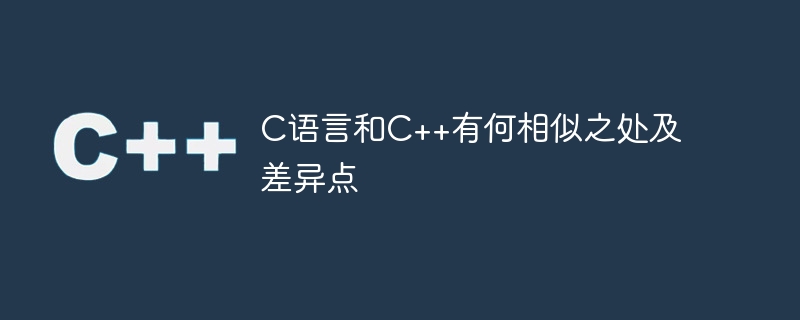Home >Backend Development >C++ >What are the similarities and differences between C language and C
What are the similarities and differences between C language and C
- WBOYWBOYWBOYWBOYWBOYWBOYWBOYWBOYWBOYWBOYWBOYWBOYWBOriginal
- 2024-03-18 12:18:03765browse

What are the similarities and differences between C language and C
C language and C are two widely used programming languages. They are both structured programming languages and have many similarities, but there are also some obvious differences. This article will analyze the similarities and differences between C language and C, and provide specific code examples for comparison.
1. Similarities:
- Basic syntax: The basic syntax of C language and C is composed of keywords, identifiers, operators, and constants It is composed of basic elements such as variables and variables, so the two have many similarities in grammatical structure.
- Data types: Both C language and C include basic data types (int, float, char, etc.) and composite data types (arrays, structures, pointers, etc.). These data types There are similar usages in both languages.
- Control structure: Conditional statements (if-else), loop statements (for, while) and selection statements (switch) are basically used in the same way in C language and C. They all use to control the flow of the program.
- Function: Functions play an important role in both C language and C. Programmers can customize functions to encapsulate specific functions and achieve modularization and reuse of code.
2. Differences:
- Object-oriented: C is a language that supports object-oriented programming, while C language is procedural programming language. C has object-oriented features such as classes, inheritance, and polymorphism, but these features are not available in the C language.
- Encapsulation: C supports class encapsulation. Data hiding and method encapsulation can be achieved through access control characters, but this kind of encapsulation cannot be achieved in C language.
- Polymorphism: C supports polymorphism and can implement function overloading and operator overloading, but these features are not supported in the C language.
- Exception handling: C introduces an exception handling mechanism, which can capture and handle exceptions through try-catch blocks, but there is no exception handling mechanism in the C language.
The following uses specific code examples to illustrate the differences between C language and C:
C language example:
#include <stdio.h>
//Structure definition
struct Person {
char name[20];
int age;
};
int main() {
struct Person person1;
strcpy(person1.name, "Alice");
person1.age = 25;
printf("Name: %s, Age: %d
", person1.name, person1.age);
return 0;
}C Example:
#include <iostream>
#include <string>
using namespace std;
// class definition
class Person {
public:
string name;
int age;
Person(string n, int a) : name(n), age(a) {}
};
int main() {
Person person1("Alice", 25);
cout << "Name: " << person1.name << ", Age: " << person1.age << endl;
return 0;
}As can be seen from the above examples, classes are used in C to implement data encapsulation and method encapsulation, while structures are used in C language to organize data, and object-oriented operations such as encapsulation and inheritance cannot be performed.
In summary, there are many similarities between C language and C, but there are also obvious differences. Programmers need to weigh them based on actual needs and project characteristics when choosing to use them.
The above is the detailed content of What are the similarities and differences between C language and C. For more information, please follow other related articles on the PHP Chinese website!

